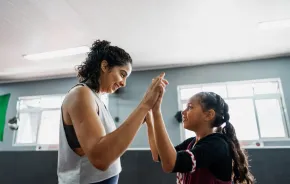
When Natalie was young, she found her passions easily. After the first day of preschool, she became a social butterfly who flitted from one play date to the next. After a couple trips to the park, she was hooked on the swings, begging for “one more push” until it was past time to go home for lunch. Until one day she came back from preschool and announced that “Tara taught me how to pump today” — the implied statement resonating in the air between us: “I don’t need you anymore.”
In elementary school, she dabbled in soccer and art and dance classes, but nothing really became Her Thing. If we lived in another time and another culture, this surely would have gone unnoticed by not only by Natalie but also by me, her mother.
But we lived in post-Internet-boom Seattle, a rich city of aspiring parents, every child a prodigy, every car leaving the school parking lot a SUV headed to the riding ring, the soccer field, or the dance studio.
By the time elementary school gave way to middle school, many of her friends had acquired identity-lending passions. Natalie became certain that Something Was Wrong, that she never would find Her Thing. My half-baked pep talks of “I didn’t find my thing till I was in college” only caused her now-adolescent eyes to narrow, her belief that I had any help to offer visibly diminishing.
Insecure parent that I was, my child’s despair at 13 over not having found her life’s avocation or possibly a vocation sent me into a tailspin. I alternated between thinking (logically) that in time she’d find her passion and (illogically) believing that if I’d been a better parent, if I were more attentive, more energetic, richer and still married, my daughter would be pirouetting across the stage of the Nutcracker right now.
Mixed into this was the fact that I believed, sometimes sensibly, sometimes not, this was Natalie’s problem to solve.
At 13, she was no longer a little girl who thought that I was cool and had great ideas. We argued over chores and homework. We’d even argued over her hip hop dance class, which she said I “forced” her to go to. Although she’d let me in enough to tell me the problem existed, she generally regarded me with suspicion. I was, in her view, inept at best, and at worst a controller without her best interests at heart.
As much as I wanted to help her, I had pretty much ruled out the possibility that I would be the one who could.
Then, one day I read about a camp for teen writers run by a nonprofit literary center in a decidedly cool area of town. As soon as I read the camp description and pictured the independence-seeking Natalie on Capitol Hill, I knew it would be something she’d like.
But then scanning down the page, I began already to rule it out. The first deterrents: The writing sample required with the application, and an interview. In a millisecond, I pictured how it would all go wrong: I’d nag her to write the required essay. For whatever reason she wouldn’t get in. I’d be to blame, and she’d run off to live on the streets of Los Angeles, her new home a warren of cardboard boxes under a freeway overpass.
But other than that, what did I have to lose?
In the end I tore out the ad and left it in her room. That night she asked me about it. She wanted to apply! I warned that the deadline loomed, about the impending essay — but she wasn’t daunted. She wrote the essay quickly and eagerly and asked me to read it. My hands clenched the printed pages.
Like the miner who quickly spots the fleck of gold flash across his pan, I knew we’d found something.
This summer Natalie finished her fifth (yep, fifth!) year at that camp for young writers. This fall, she was picked to be on the center’s Teen Leadership Board. She organizes open-mike events, promotes the youth program, and mentors other young writers.
She's been accepted to art school to study filmmaking for the fall and spends much of her time these days dreaming about college. She worries, she says, about her friends who lack direction and a passion.
Maybe, I think, they just need one more push.
 Theo Pauline Nestor is the host of the Wild Mountain Memoir Retreat (March 15-17 with keynote speaker Cheryl Strayed, author of Wild) and author of How to Sleep Alone in a King-Size Bed. Her work has been published in the New York Times, WomansDay.com, the Huffington Post, Brain,Child magazine and more. An instructor for UW PCE's Certificate in Memoir program, Nestor also coaches writers. Learn more about her at Writing Is My Drink .
Theo Pauline Nestor is the host of the Wild Mountain Memoir Retreat (March 15-17 with keynote speaker Cheryl Strayed, author of Wild) and author of How to Sleep Alone in a King-Size Bed. Her work has been published in the New York Times, WomansDay.com, the Huffington Post, Brain,Child magazine and more. An instructor for UW PCE's Certificate in Memoir program, Nestor also coaches writers. Learn more about her at Writing Is My Drink .












